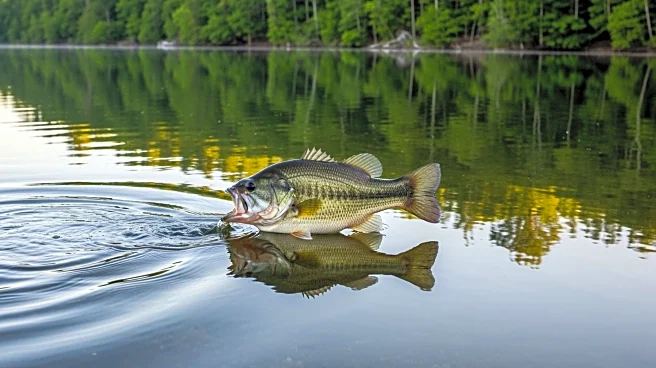What's Happening?
The Arkansas Game and Fish Division is intensifying its efforts to improve the state's trophy bass program by optimizing Florida Bass broodstock. This initiative involves a partnership with Red Hills Fishery of Georgia to conduct a comprehensive genetic
and physical evaluation of hatchery broodstock. The evaluation process included gathering data from over 1,000 Florida Bass at the Andrew H. Hulsey and Joe Hogan State Fish Hatcheries. The broodstock are used to produce over a million Florida Bass fingerlings annually, which are then stocked in public waters. This effort aims to ensure the stocking of superior Florida Bass, enhancing the quality and sustainability of the state's bass population.
Why It's Important?
The enhancement of the trophy bass program in Arkansas is significant for several reasons. Firstly, it supports the local fishing industry by potentially increasing the size and quality of bass available to anglers, which can attract more fishing enthusiasts to the state. This can lead to economic benefits through increased tourism and related activities. Additionally, the program contributes to biodiversity and the ecological balance within Arkansas's aquatic ecosystems. By ensuring the genetic quality of stocked bass, the program helps maintain a healthy fish population, which is crucial for the long-term sustainability of the state's natural resources.
What's Next?
The ongoing efforts to optimize Florida Bass broodstock are expected to continue, with further evaluations and adjustments to improve the program's effectiveness. The success of this initiative may inspire other states to adopt similar strategies to enhance their own trophy bass programs. Stakeholders, including local anglers, environmental groups, and tourism boards, are likely to monitor the program's outcomes closely. Future developments may include expanded partnerships with other fisheries and increased investment in hatchery facilities to support the growing demand for high-quality bass fingerlings.
Beyond the Headlines
The initiative to enhance the trophy bass program in Arkansas also highlights broader environmental and conservation efforts. It underscores the importance of genetic research and collaboration between states and private entities in managing wildlife resources. This approach not only benefits the fishing industry but also sets a precedent for other conservation programs aiming to balance ecological health with economic interests.
















